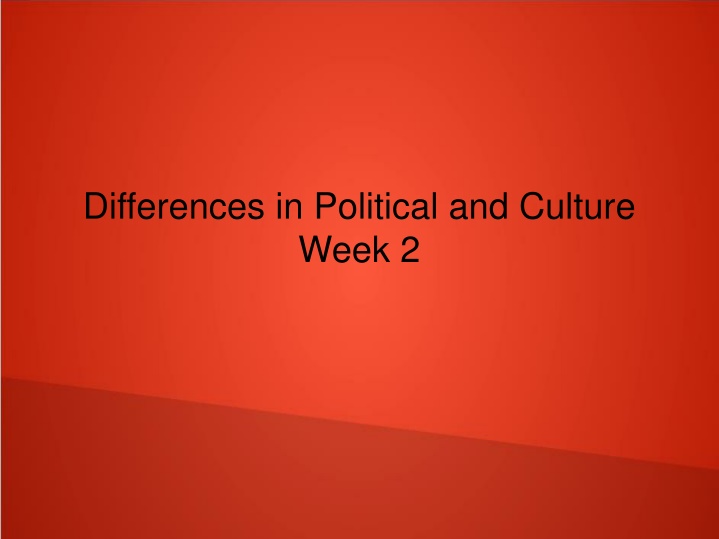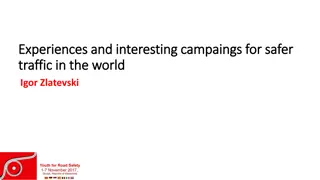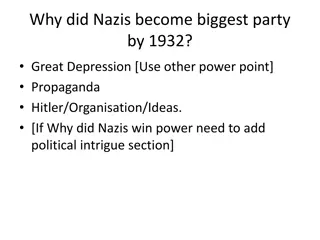How International, European, and National Campaigns Work Together
This content discusses the collaboration between international, European, and national campaigns in addressing rare diseases as a priority. It explores the advocacy roadmap, UN resolutions, European Action Plan, and key background work that aims for holistic care, inclusive policies, and improved access to treatments. The progression from international to national levels is highlighted, emphasizing the importance of collective efforts towards common goals.
Download Presentation

Please find below an Image/Link to download the presentation.
The content on the website is provided AS IS for your information and personal use only. It may not be sold, licensed, or shared on other websites without obtaining consent from the author.If you encounter any issues during the download, it is possible that the publisher has removed the file from their server.
You are allowed to download the files provided on this website for personal or commercial use, subject to the condition that they are used lawfully. All files are the property of their respective owners.
The content on the website is provided AS IS for your information and personal use only. It may not be sold, licensed, or shared on other websites without obtaining consent from the author.
E N D
Presentation Transcript
Globalization The world is moving away from self-contained national economies toward an interdependent, integrated global economic system Globalization refers to the shift toward a more integrated and interdependent world economy
Whay globalization? The decline in barriers to the free flow of goods, services, and capital that has occurred since the end of World War II since 1950, average tariffs have fallen significantly and are now at 4 percent countries have opened their markets to FDI Technological change microprocessors and telecommunications the Internet and World Wide Web transportation technology
Political Economy Political economy of a nation - how the political, economic, and legal systems of a country are interdependent they interact and influence each other they affect the level of economic well-being in the nation
What is Political Economy Political system - the system of government in a nation Assessed according to the degree to which the country emphasizes collectivism as opposed to individualism the degree to which the country is democratic or totalitarian
Link between political and economy Political ideology and economic systems are connected countries that stress individual goals are likely to have market based economies in countries where state-ownership is common, collective goals are dominant
Political System Collectivism --> socialism Communism Social democrat Individualism Democracy Totalitarianism
Economic System Market economies Command economies Mixed economies
Legal System There are three types of legal systems 1.Common law - based on tradition, precedent, and custom 2.Civic law - based on detailed set of laws organized into codes 3.Theocratic law - law is based on religious teachings
Culture Culture is a system of values and norms that are shared among a group of people and that when taken together constitute a design for living where values are abstract ideas about what a group believes to be good, right, and desirable norms are the social rules and guidelines that prescribe appropriate behavior in particular situations Society refers to a group of people who share a common set of values and norms
Determinants of Culture Determinants include religion political and economic philosophies education language social structure
Culture in Workplace Management processes and practices must be adapted to culturally-determined work-related values Geert Hofstede identified four dimensions of culture 1.Power distance - how a society deals with the fact that people are unequal in physical and intellectual capabilities 2.Individualism versus collectivism - the relationship between the individual and his fellows 3.Uncertainty avoidance - the extent to which different cultures socialize their members into accepting ambiguous situations and tolerating ambiguity 4.Masculinity versus femininity -the relationship between gender and work roles
What Do Cultural Differences Mean For Managers? 1.It is important to develop cross-cultural literacy companies that are ill informed about the practices of another culture are unlikely to succeed in that culture managers must beware of ethnocentric behavior, or a belief in the superiority of one's own culture 2.There is a connection between culture and national competitive advantage suggests which countries are likely to produce the most viable competitors has implications for the choice of countries in which to locate production facilities and do business























